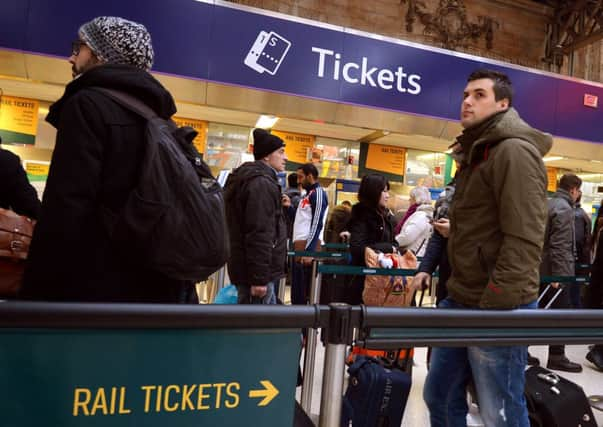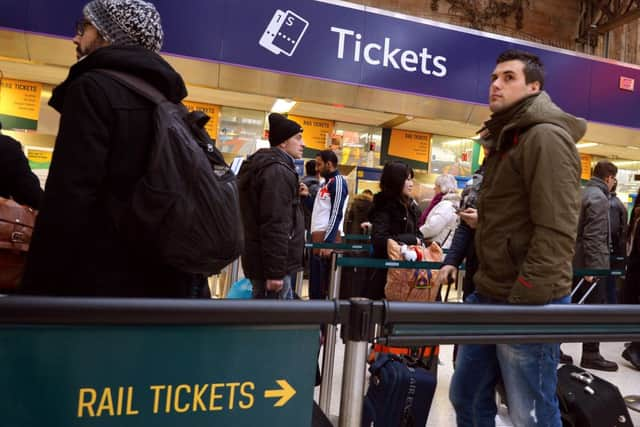Passengers on warpath over train fare rises: How much will YOUR ticket cost now?


In the cold and dark at King’s Cross station in London, travellers spoke of their anger at the annual rise and their view that rail travel offered poor value for money.
“It’s a lot of money for a poor service,” said teacher Simon Jones, 30, as he waited to board a train to Newcastle upon Tyne with his friend Ben James, 33.
Advertisement
Hide AdAdvertisement
Hide AdMr Jones was on a leisure trip today but he and Mr James normally commute to work in London from Wandsworth in south west London.


Mr Jones said: “Fares are pretty high. My salary has just gone up 1% but fares are rising around 3%. There are delays on practically every day.”
Sales manager Adam Jones, 35, travelling back from King’s Cross to Harrogate in Yorkshire with his girlfriend Jessica Burdge, is a season ticket holder on the Harrogate-Leeds route.
He said: “My service is not as frequent as it should be and has very old carriages.”
Advertisement
Hide AdAdvertisement
Hide AdThe 3.1% rise taking effect today is for regulated fares which include season tickets. The increase on unregulated fares, typically off-peak leisure tickets, is not capped.
But a number of these fares, including some on the East Coast route, are going up by much less than 3.1%, with the overall rise in tickets - regulated and unregulated - being 2.8%.
The regulated fare increase pushes some commuters into the £5,000-a-year “club”, with annual season tickets to London from Deal and Dover Priory costing £5,012.
An annual season ticket between Leeds and Ilkley will now cost £1,156; between Leeds and Harrogate £1,536; between Leeds and Skipton £1,792; and between Malton and York £1,600.
Advertisement
Hide AdAdvertisement
Hide AdRail fares are rising so fast that by 2018 the Government will be making “a profit from passengers”, according to a new report.
The study commissioned by the Campaign for Better Transport (CBT) found that within four years fares revenue will cover 103 per cent of the operating costs of the railway – up from 80 per cent in 2009.
Authors of the report, consultants Credo, said that by 2018 the Government’s share of funding the railways will have fallen to just 20 per cent, which is down from 38 per cent in 2009.
The findings come as train travellers nationwide are handed season ticket fare rises of 3.1 per cent on average. Leeds-Wakefield season tickets have gone up from £964 to £992 as of today.
Advertisement
Hide AdAdvertisement
Hide AdThe Action for Rail (AfR) group has also released findings which show that UK commuters are spending far more of their salaries on fares than some European passengers.
The CBT’s chief executive, Stephen Joseph, said: “Rail fares have been rising faster than wages for a decade now, putting ever more strain on household costs.
“What this report shows is that by the next Parliament income from fares will not only cover the entire running costs of the railways, the Government will actually begin to start profiting from passengers.”
Rail Minister Stephen Hammond, speaking at King’s Cross Station, said: “I think the public quite rightly thinks the Government should be doing more and we shall be pressing the train companies and Network Rail to provide value for money.”
Advertisement
Hide AdAdvertisement
Hide AdHe was asked about a Daily Mail story which said the Government planned to pay train companies to convert first-class carriages into accommodation for all passengers.
Mr Hammond replied that in offering new franchises the Government was looking at a number of options for rail travel and was in negotiations with a number of train companies about a number of ideas.
On the claim that rail travel was far more expensive in the UK than in parts of Europe, Mr Hammond said that some of the comparisons had been made using some of the more-expensive UK routes and some of the ultra-cheap European ones.
He said that many UK comparable fares were cheaper than the Rome to Naples route in Italy.
Advertisement
Hide AdAdvertisement
Hide AdMr Hammond said: “We made extra money available so fares did not rise above the inflation rate. Labour have spoken of a cost-of-living crisis but it is they that caused it. We are a Government that is protecting the consumer today and investing in the future.”
Speaking further about the possible first-class carriage plan, Mr Hammond said: “There are some new ideas we are looking at. This is one of them. Is it going to happen? It may. It may not.”
It was put to Mr Hammond that some people’s perception of the railways was one of poor value for money and constant delays.
He replied: “One of my jobs is to get that perception changed. It’s no good just fining Network Rail for poor performance and that money going back to the Treasury. We want the company to improve.”
Advertisement
Hide AdAdvertisement
Hide AdPassengers at King’s Cross were greeted by trade union campaigners urging rail reform. Bob Crow, general secretary of transport union the RMT, said: “Train companies are most concerned about providing dividends to shareholders.”
• What do you think about the service on the railways? Leave your comments below,